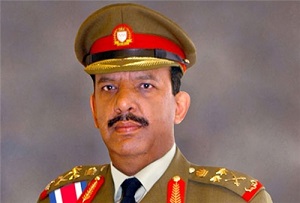(Ahlul Bayt News Agency) - “The US has lost its friends among the Persian Gulf littoral Arab states due to its policies regarding certain regional countries,” Khalifa said in an interview with al-Ayyam newspaper on Wednesday.
Noting that the western states don’t have permanent friends but have permanent interests, he said, “They are present in the region for their interests and strategic needs and not for supporting us.”
Al-Khalifa also expressed concern about the Geneva deal between Iran and the Group 5+1 (the US, Russia, China, Britain and France plus Germany) to settle their dispute over Tehran’s nuclear program.
In relevant remarks in December, foreign ministers of three Arab states called for the participation of the Persian Gulf Cooperation Council (PGCC) and the Arab League in the talks between Iran and the Group 5+1.
Qatari Foreign Minister Khalid bin Mohammad al-Attiyah underlined the need for the Persian Gulf Arab littoral states' participation in the Iran-Group 5+1 nuclear talks.
“It is the right of the six PGCC member-states to have a seat at the negotiating table as main partners to regional stability,” al-Attiyah said.
The Egyptian Foreign Minister Nabil Al-Fahmi also urged that the Arab League should partake in the Iran-West talks on the former's nuclear program.
In similar remarks, Yemeni Foreign Minister Abu Bakr Al-Qirbi also said that Yemen and the Persian Gulf littoral states ought to be present in Iran’s nuclear talks.
The demands were rejected by both sides with Iran explaining the reason why Iran is negotiating with the Sextet is that they are members of the UN Security Council which currently handles Iran’s nuclear dossier.
On November 24, Iran and the world powers sealed a six-month Joint Plan of Action to lay the groundwork for the full resolution of the West’s decade-old dispute with Iran over its nuclear energy program. In exchange for Tehran’s confidence-building bid to limit certain aspects of its nuclear activities, the Sextet of world powers agreed to lift some of the existing sanctions against Tehran and continue talks with the country to settle all problems between the two sides.
Then after several rounds of experts talks on how to enforce the agreement, Iran and the six major world powers finalized an agreement on ways to implement the deal.
/149
Noting that the western states don’t have permanent friends but have permanent interests, he said, “They are present in the region for their interests and strategic needs and not for supporting us.”
Al-Khalifa also expressed concern about the Geneva deal between Iran and the Group 5+1 (the US, Russia, China, Britain and France plus Germany) to settle their dispute over Tehran’s nuclear program.
In relevant remarks in December, foreign ministers of three Arab states called for the participation of the Persian Gulf Cooperation Council (PGCC) and the Arab League in the talks between Iran and the Group 5+1.
Qatari Foreign Minister Khalid bin Mohammad al-Attiyah underlined the need for the Persian Gulf Arab littoral states' participation in the Iran-Group 5+1 nuclear talks.
“It is the right of the six PGCC member-states to have a seat at the negotiating table as main partners to regional stability,” al-Attiyah said.
The Egyptian Foreign Minister Nabil Al-Fahmi also urged that the Arab League should partake in the Iran-West talks on the former's nuclear program.
In similar remarks, Yemeni Foreign Minister Abu Bakr Al-Qirbi also said that Yemen and the Persian Gulf littoral states ought to be present in Iran’s nuclear talks.
The demands were rejected by both sides with Iran explaining the reason why Iran is negotiating with the Sextet is that they are members of the UN Security Council which currently handles Iran’s nuclear dossier.
On November 24, Iran and the world powers sealed a six-month Joint Plan of Action to lay the groundwork for the full resolution of the West’s decade-old dispute with Iran over its nuclear energy program. In exchange for Tehran’s confidence-building bid to limit certain aspects of its nuclear activities, the Sextet of world powers agreed to lift some of the existing sanctions against Tehran and continue talks with the country to settle all problems between the two sides.
Then after several rounds of experts talks on how to enforce the agreement, Iran and the six major world powers finalized an agreement on ways to implement the deal.
/149

